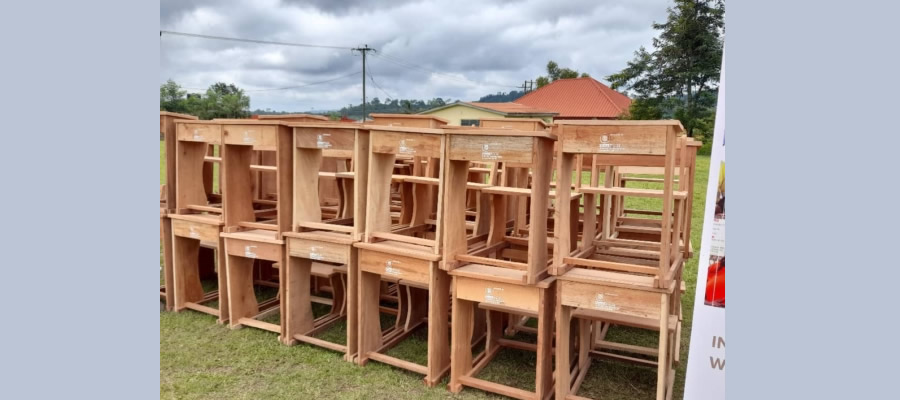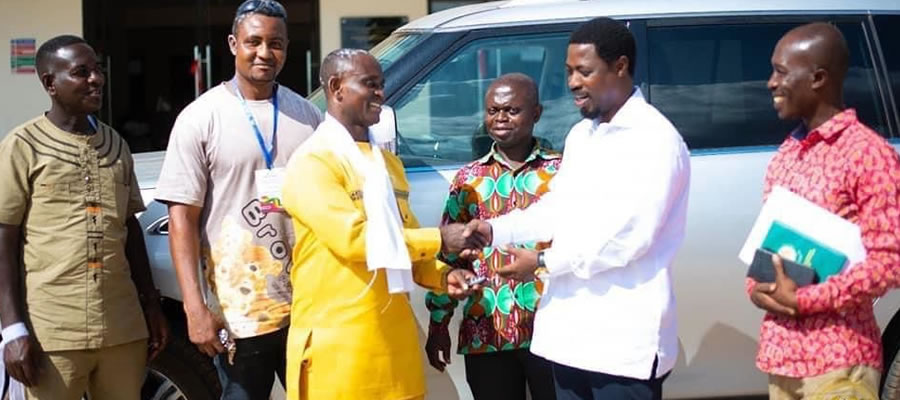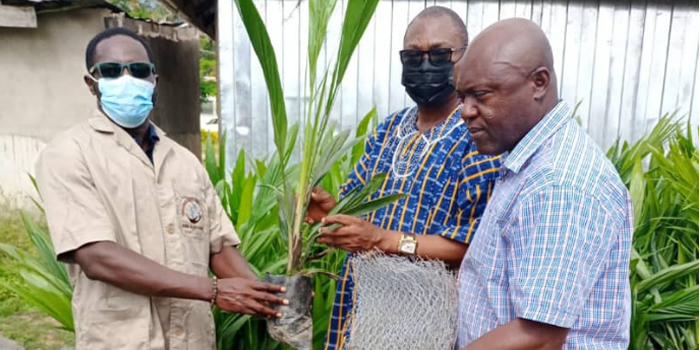

Local Economic Development (LED)
Local economic development which includes various local initiatives to tap the local economic resources for economic growth and improve the lives of the pro-poor people is not fully developed in the Municipality due to inadequate socio-economic infrastructure base and inadequate human capacity.
Some are designed specifically to help poor people directly while others are created to support economic growth in the Municipality. Due to their significant impacts on the growth of the local economy, the Assembly within the next plan period will concentrate in the following areas in promoting local economic development. These include;
a. supporting micro enterprises (run by one or two persons)
b. supporting small business development c. providing skill training
d. encouraging domestic or foreign investment by providing infrastructure-like good roads, electricity, or further reducing crime
e. providing municipal services such as education, health, regulations etc. which support LED
Economy of the District
The Bibiani-Anhwiaso-Bekwai Municipal is predominately an agrarian economy with minimal activities of secondary and tertiary sectors. Agriculture employs about 76% of the total labour force or the population. Agriculture is rain fed in the Municipality and characterised by the use of outmoded farm implements and cultural practices. However, the Municipality has high potential for agro-processing, which is yet to be tapped. The Municipality economy is described in terms of structure, Major Economic Activities, Services, Revenue and Expenditure Status, Revenue Base, Economic Resources, Inter/Intra-Trade, Economically Active Population/ Labour Force, etc.
Structure of Local Economy
This section of the plan looks at the structure of the economy with respect to the performance of the various sectors namely agriculture, industry and the services in terms of employment and contribution to household income. As stated earlier, the structure of the local economy is skewed towards agriculture, which employs about 76% of the Municipality’s working population with 55.3% female participation. Next to agriculture is the service sector which employs about 15%. The industrial sector, which is dominated by small-scale industries follows the service sector in term of the working class also employs about 9.0%. Although the Municipality has great potential in agro-processing, the weak nature of its industrial sector remains a constraint to the balanced development of the Municipality.
Commerce
This sub-sector provides employment for a considerable number of people in the Municipality. The major items of trade are agricultural products and inputs, orthodox and herbal drugs, auto-parts, clothing, provisions and petroleum and plastic products. Women dominate the commerce sub-sector in the Municipality. However, their contribution to the local economy is not much felt due to the small nature of their businesses (petty trading). Commerce in the Municipality is an area that has not been fully harnessed for socio-economic development as compared with farming.
The Municipality has two major market centres located at Bibiani and Sefwi Bekwai and a minor one at Pataboso Junction. The fortunate issue about these market centres is that, they operate effectively on different days of the week such as Wednesday, Thursday and Friday at Sefwi Bekwai, Pataboso Junction and Bibiani respectively which provides the opportunity for producers and traders to send their products/wares to all the market centres as possible within the week. This situation increases sales of traders as well as revenue base of the Assembly. This also affects the growth and the development these markets.
However, infrastructure development at these market centres is still moving gradually. The markets do not have adequate essential structures such as stores/stalls, places of convenience and sanitary equipment.
Services
This is the fastest growing sector in the Municipality; employing 9,246 people representing 19.2% of the total labour force employed in the year 2000 and 15,664 people in the year 2005 representing 27%. It is the highest contributor to household income (35%).
Type of Service
Petty Trading
Petty trading is the dominant form of service activity in the Municipality. About 74.3% of those in the service are employed in this area. Clerical work and “others” (driving, tailoring, hairdressers, banking etc) account for 9.4% and 17.2% respectively. There are other services available in the Municipality such as banking, telecommunication and postal services, electricity, security (Police and Immigration) and judicial services.
Banking
There are three commercial banks and three rural banks operating in the district namely SG Bank Limited at Bibiani, Merchant Bank at Bibiani, HFC Bank Limited at Sefwi Bekwai, Upper Amenfi Rural Bank Ltd at Sefwi Bekwai, Awaso and Bibiani, Sefwiman Rural Bank Limited at Bibiani, Atwima Mponua Rural Bank Ltd at Bibiani and Amanano Rural Bank Ltd at Bibiani. The Municipality capital has almost all the major financial institutions in the Municipality. This is attributed to the fact that Bibiani is the hub of commercial activities. These financial institutions contribute towards the development of the Municipality through the granting of credit facilities and investment.
There are other financial institutions like the Susu and Co-operative credit unions which operate in big towns in the Municipality. One thing about these financial institutions is that they are easily folded-up. The difficulty people experience with this phenomenon is that people find it extremely cumbersome to retrieve their moneys mobilised by these financial institutions which sometimes end at the law courts. 68 Such spatial distribution of financial institutions in the Municipality enhances people access to banking services.
Telecommunication and Postal Services
Telecommunication facilities or services which were very limited in time past are now covering almost the entire Municipality in 2017. The leading telephone operators operating in the Municipality are MTN, Vodafone, Tigo and Airtel. Internet facilities are also available for communication. This telephone system is sometimes not reliable as it often breaks/cuts. Notwithstanding that, this has enhanced communication and businesses among the people in the Municipality and outside.
In terms of postal services, the Municipality has two post offices at Bibiani and Sefwi Bekwai which have improved postal services tremendously and impact positively on the development of the Municipality. There is one at Awaso which is not functional.
Fire Service
There is a fire service station in the Municipality located at Bibiani, the Municipality capital with fire service officers. The station has fire-fighting equipment e.g. fire tender or vehicle. This has a positive development implication in terms fire outbreaks and emergencies in the Municipality.
Electricity
Energy for that matter electricity is one of the key pillars for economic growth and development. Therefore, the presence of national grid in the Municipality has great potentials for growth in areas such as agro-processing, trading, manufacturing both for commercial and domestic uses hence poverty reduction.
Police Service
The Municipality has assumed a status of Divisional Police Command with a Divisional Police Commander stationed at Bibiani with two District Police Commands stationed at the police headquarters, Bibiani. and Sefwi Bekwai respectively. There are five Police Stations and three Police Barriers in the Municipality. The stations lack decent offices and residential accommodation for stationed officers. Additionally, inadequate staff is one major problem that has bedevilled the police administration over the years in the Municipality.
Other Security
Agencies Immigration and BNI are stationed in the Municipality to enhance general security and peace.
Judicial Service The district has Circuit and Magistrate Courts which are all established at Bibiani presided over by qualified judges. The presence of the courts has brought justice and so much relief to the people. Hitherto, cases had to be sent to Sefwi Wiawso for redress.
Revenue and Expenditure Status
As stated earlier in the performance review, revenue generation and proper expenditure patterns play a key role in the speedy development of the Municipality’s economy. The revenue base and expenditure patterns and their actual performance have been discussed below.
Revenue
A critical look at the revenue base of the BABMA reveal that the Assembly relies heavily on government grants comprising Local Government Grants, Central Government Grants, Ceded Revenue and District Assembly Common Fund and sometimes Donor support. The District Assembly’s internally generated revenue is vibrant and very much appreciable as compared with inflows from external sources (Grants).
Grants to the Assembly far exceeded the internally generated revenue due to the following factors:
• Poorly developed market infrastructure in the Municipality.
• Inadequate regular revenue staff.
• Low calibre of Revenue Collectors.
• Inadequate logistics for the Revenue Mobilisation Unit.
• Unwillingness of the people to pay taxes.
• Poor database on revenue mobilization
The number of revenue staff is 37 in 2017 of which 83.8% are commission collectors is indicated in Table 1.16.
Economic Resources
As stated under the physical characteristics of the profile, the Municipality is well endowed with many economic resources, which tremendously support the national economy of Ghana. These resources include cocoa, timber and mineral deposits (Gold and Buaxite) as well as fertile soil for the cultivation of variety of crops. However, the people and for that matter the district are yet to receive the full benefit of these mineral deposits and other equally important potential resources that are being exploited. This has influenced the slow pace of development of the Municipality.
Inter/Intra – Trade
Like any other place, trading activities take place within and outside the Municipality. The Municipality with its strategic location trades with neighbouring communities in other districts in Ghana such as Atwima Mponua, Wassa Amenfi West, Sefwi Wiawso, Upper Dankyira West and Amansie East.
Goods that are normally associated with inter trade of the Municipality are second-hand clothes, foot wares, cooking utensils, electrical gadgets and many more. The Municipality also transacts business with the outside world mostly in foodstuffs because of the nature of its economy, which is mostly dominated by agricultural products.
In addition, intra-trade goes on well in the Municipality as the two major towns have market centres. During market days, the people in the district who are mostly farmers bring their foodstuffs and other agriculture products to the market centres for sale.
The main commodities for export to the neighbouring Municipality, other parts of the country and outside the shores of Ghana mainly include agricultural products (food crops) such as plantain, cocoyam, cassava etc and (cash crops) as cocoa, wood.
The inter-trade between the Municipality and outside world has the potential of improving the internally generated revenue base of the Assembly and individuals as people who come to the Municipality to do business are taxed. It also opens up the Municipality for development. Inter-trade has the potential of creating effective interaction and peaceful co-existence among towns, villages and the people in the Municipality.
However, inter-trade puts pressure on the limited infrastructure facilities and creates security problems for the Municipality. Again, it poses health problems for the Municipality, especially in terms of HIV/AIDS.
Food Security
The soil conditions favour the cultivation of varieties of tree crops and food crops. Livestock production and general agriculture have great potential in the Municipality. The soil in the Municipality is part of the forest ochrosols and support large scale production of food crops including plantain, cassava, rice, cocoyam and food baskets in the region. Reports from the Department of Agriculture indicates that all the major food crops such as cassava, yam, cocoyam, plantain and palm oil are produced in sufficient quantities in the district except maize and rice. With the introduction and implementation of the Planting for Food and Jobs Programme and the European Union Grant Support Project to local food crops farmers, coupled with the good weather condition prevailing, the Municipality the potentials to overcome the deficit in maize and rice in the not too distant future.
Also the vibrant markets in the Municipality like the Bibiani, Bekwai and Pataboso junction markets contribute considerably to the effective distribution of these farm produce. Moreover, since the Municipality is mainly an agrarian economy most households get access to food from their own farms. There is availability of food throughout the year at reasonable prices. This had ensured that most households have access to at least two square meals a day
One disturbing trend in the Municipality is that the choice lands are being used for cocoa cultivation. When this trend is not checked, in the very near future, food production will decline with its attendant high 73 prices of food stuff. This could lead to social unrest resulting in stealing, sexual promiscuity and armed robbery.
NUTRITION
The nutrition situation in the Municipality is not bad but report from the Municipality Health Directorate indicates that there is an upsurge of dietary related diseases like hypertension, diabetes, ete.
This requires public education on healthy lifestyle such as:
eating more fruits and vegetables;
drinking more water;
consuming less sugar and salt;
avoiding the use of drugs e.g Cigarette;
and exercise the body regularly.
Date Created : 5/4/2023 12:00:00 AM













 facebook
facebook
 X
X
 Youtube
Youtube
 instagram
instagram
 +233 593 831 280
+233 593 831 280 0800 430 430
0800 430 430 GPS: GE-231-4383
GPS: GE-231-4383 info@ghanadistricts.com
info@ghanadistricts.com Box GP1044, Accra, Ghana
Box GP1044, Accra, Ghana